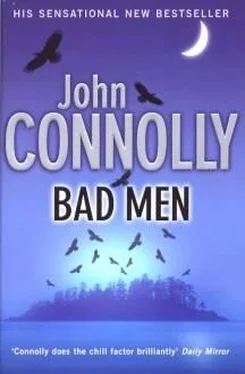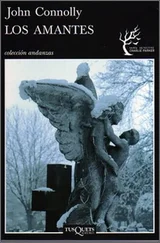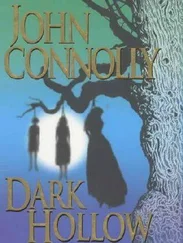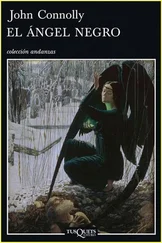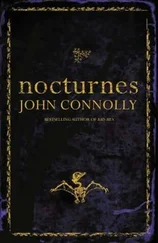But the woods had changed in recent times. In the past, Richie had caught glimpses of the boy, the one who stood at the water’s edge staring out at the sea, the boy who left no footprints on the wet sand. Richie had tried calling to him, and waving, but the boy never looked back, and eventually Richie had given up trying to talk to him. Sometimes he saw the boy in the woods, but mostly the boy stayed by the shore and watched the waves break. The boy didn’t frighten Richie, though. The boy was dead. He just didn’t want to leave the island, and Richie could understand that. Richie didn’t want to leave the island either.
But the Gray Girl did frighten Richie. He had seen her only two or three times, hanging in the air, her feet not quite touching the ground, her eyes like the backs of black beetles that had crawled into her head and nested in her sockets, but she scared Richie bad enough to make him piss his pants. The Gray Girl was angry, angry with everyone who lived because she wanted to be alive too. The boy was waiting for something, but the little Gray Girl didn’t want to wait. She wanted it now . So Richie had begun to stay away from the Site, where the woods were thickest, and from the tall watchtower at the center of the island. He used to like the big watchtower a lot. From the top, he could see for miles and miles, and the wind would blow his hair and he could taste the sea on his tongue when he opened his mouth. But that was the Gray Girl’s place now. Joe Dupree came by to check on it, and he would make sure that the door was locked, but the Gray Girl didn’t like it when the door was locked so she found ways to open it again. The Gray Girl wanted the door open, because if it was open, then people might come in.
And if people came in, and they weren’t too careful, then they might get to play with the Gray Girl.
She was the worst, but there were others too, and the area around the tower and the cross belonged to them. To go in there now would be like standing in front of a train. The train wouldn’t mean to hit you, wouldn’t have any intention of hurting you, but if you got in its way, it would kill you as it hurtled toward its destination. That was what the woods now felt like to Richie: a dark tunnel, with a train rushing through it, ready to smash anything in its path.
But the shore was still safe, and there were trees beneath which to shelter. Except tonight the snow had started to fall really heavily, heavier than Richie had ever seen it fall before, and the wind had grown very strong and had blown the snow into Richie’s eyes. He had sought cover in one of the old observation towers, a little one by the road, hoping to wait out the bad weather. Then the boat had come. He could barely make it out until it got close to shore, but he heard the men as they reached land.
And suddenly, he was afraid.
He wanted to go home.
He left the shelter of the tower just as the black man appeared and saw him.
Tell’s voice brought Willard back. He could no longer perceive Moloch and the others, for they had now ascended the slope, but he thought that he could still catch glimpses of their flashlight beams through the snow. There was a pain in Willard’s belly. It made him want to curl up in a ball, like a little child. His eyes stung and he felt tears creep down his cheeks.
“I said, you want to stow these away?”
Willard wiped his face hurriedly as Tell handed him a stack of life jackets. He pointed to the storage chest at the stern of the little boat.
“In there.”
Willard took the jackets in his arms, then knelt down to store them. Behind him, he heard Tell rummaging in his pack, then sensed the little man moving close behind him. He looked over his shoulder and into the barrel of the pistol. Tell’s own gun, a Colt.45, was still in his belt. The gun in his hand was a one-shot.22, silenced to hell and back.
No noise, that was Moloch’s instruction to Tell. No noise and no pain.
“You’re a crazy bastard, you know that?” said Tell. “You gave us all the fucking creeps.”
Willard didn’t blink as the trigger was pulled.
“He’s a dummy,” said Dexter.
Powell looked at him.
“What did you say?”
“The guy’s a dummy,” repeated Dexter. “He’s handicapped.”
Richie stood across the road from them, but didn’t move. Powell squinted against the snow and saw the man’s face, except now that he looked, the man seemed younger, more a kid than an adult. But Dexter was right. The kid, or man, or whatever the hell he was, was retarded.
“What are we going to do with him?” asked Powell.
“Take him back to the boat, I guess,” said Scarfe. “Let Tell keep an eye on him until we got to go, then turn him loose.”
He heard a scrabbling sound behind him, and turned to see Moloch hauling himself up the last stretch of trail with the aid of a sapling.
Moloch looked at Richie, and Richie stared back.
“Bad men,” said Richie.
“What did he say?” asked Powell.
Richie began to walk quickly away, but they could hear him muttering to himself.
“He recognized me,” said Moloch.
“The fuck could he do that? Dex said he was a dummy.”
“I don’t know how. TV maybe. Stop him.”
Dexter and Powell began to move after him, but the snow was thicker up here on the exposed road, and they struggled and slipped as they tried to catch up with him.
“Hey, wait up!” called Dexter, but Richie kept his head down, his face set determinedly. It was the face he wore when other boys taunted him, or tried to show him pictures of naked ladies.
It was the face he wore when he was afraid, and trying not to cry.
“Bad men,” he whispered to himself. “Badmenbadmenbadmen.”
Behind him, he heard the black man swear loudly as he stumbled.
Richie started to run.
Carl Lubey was beginning to panic. He had tried everything he knew and there was still no sign of life from the truck. As a last resort, he’d decided to change the battery. He was lifting the spare from the back of the garage when the radio in the truck exploded into life, almost deafening him with the last bars of “Freebird.” The radio was permanently tuned to the island’s amateur station, run by Dickie Norcross out of his attic, except Dickie broadcast only between the hours of two and six, and it was now well past Dickie’s good-bye time.
“And that one’s going out to all the folks on the island who are battening down the hatches for a hard night ahead,” said the disc jockey’s voice. It sounded strangely familiar to Carl. It wasn’t Dickie Norcross, not by a long shot. Dickie had a kind of high-pitched voice, and tended to limit his voice-overs to birthday greetings and obituaries. This was a woman’s voice.
“Especially Carl Lubey over there in the deep, dark forest, who’s having trouble with his truck. Ain’t ya, Carlie?”
The voice was distorted, as though the woman had just put her mouth right over the mike.
“This one’s for you, Carl,” said the voice, and then the first bars of “Freebird” commenced. “Freebird”: his brother’s favorite song.
“It’s all ‘Freebird,’ all night,” continued the DJ, and Carl knew the voice, recalled it from that night in the Old Port when his brother had leaned into little Jeanne Aiello as their voices rose in harmony over the sound of some piece of southern-rock shit playing on the jukebox.
Carl Lubey grabbed a crowbar and smashed the radio with one blow, sending the dead woman’s voice back into the void from which it had issued.
“Fuck!” said Dexter. The dummy was disappearing from sight. Even in his bright orange winter clothing he would soon be lost in the snow. Already he was little more than a blur among the falling snowflakes, but for some reason he was staying away from the woods. Instead, Dexter could see him silhouetted against the cliff edge some forty feet above the water, running with a strange, awkward gait, his elbows held rigid against his sides.
Читать дальше
